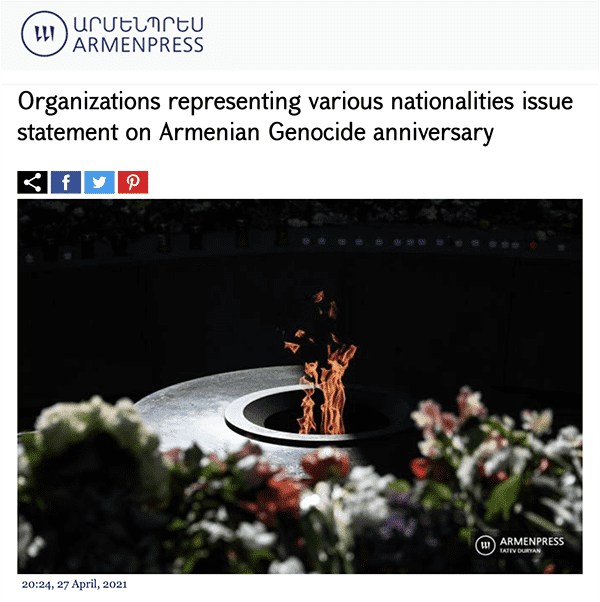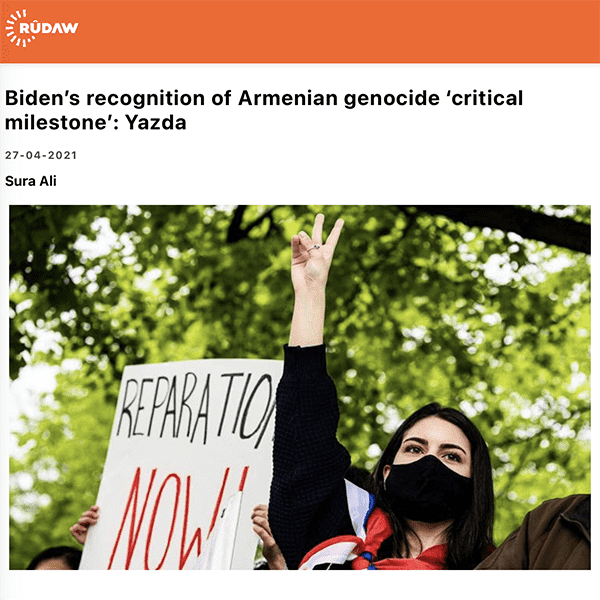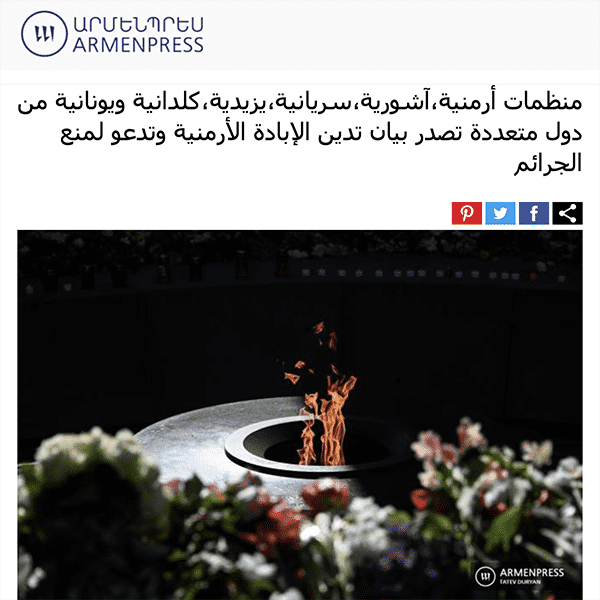To commemorate genocide, we must give voice to the Armenians, Assyrians, Syriacs, Chaldeans, Yazidis, and Greeks
FOR NEXT-DAY RELEASE
Press release
Joint communities statement on Armenian Genocide Remembrance Day
On the eve of the first official United States presidential recognition of the Armenian Genocide, as community organizations representing Armenians, Assyrians, Chaldeans, Syriacs, Yazidis, and other organizations who are advocating for victims, we wish to share a recognition of our own.
April 24, 1915 marked the day intellectuals and leaders of the Armenian community were killed, initiating a program against the Armenian people. On this day, we must remember the lives lost to genocide. An estimated 1.5 million Armenians were killed.
We must also remember that genocide creates a culture of impunity setting a fertile ground for future atrocities and crimes against humanity. Precedence is legitimized when justice is not promptly and fully realized. This is true in the case of the Armenians, as it is true in the cases of other genocides, including the Da’esh genocide against the Yazidis, Assyrians, Chaldeans, Syriacs, and others.
As genocide by Da’esh continues in Sinjar, safety and security are also under severe threat as military air strikes by the Turkish Air Forces continue to bomb villages inhabited by the Assyrians and Yazidis. Insecurity is now a chronic ailment, giving no capacity to initiate policies to rebuild Sinjar and return the more than 300,000 people displaced since the start of the genocide. The destruction by Da’esh of Mosul, home to Armenian, Chaldean, and Syriac communities, as well as villages in the Nineveh Plains inhabited by Assyrians, Chaldeans, Syriacs, and Yazidis has made safe return deeply challenging. The Yazidis, Christian communities, and other religious minorities continue to face the threats of further atrocities and even community extermination. Our communities are evidence of how humanity pays the most severe of consequences when justice is not served.
The recognition of the Armenian Genocide by the President of the United States Joseph Biden, following that of U.S. Congress, is a critical milestone. On the occasion of this commemoration, we call for the full, all-inclusive recognition of all acts of genocide that deserve equal honor. However, it cannot stop at words. It is indispensable that policies and actions preventing and responding to genocide be grounded in comprehensive approaches that ensure accountability and justice for all survivors, families of victims, and communities.
List of co-signatories:
Ankawa Humanitarian Committee (Iraq)
Assyrian Policy Institute (USA)
Coalition for Genocide Response (UK)
Emma Organization for Human Development (Iraq)
Eyzidi Organization for Documentation (Iraq)
Ghasin Al-Zaiton Organization (Iraq)
Hammurabi Human Rights Organization (Iraq)
Harikar Organization (Kurdistan Region)
Jiyan Foundation (Iraq)
Justice Organization for Minorities Rights (Iraq)
Masarat MCMD (Iraq)
Methra Organization for Yarsan Cultural and Development (Iraq)
Nadia's Initiative (USA)
Shams Humanitarian NGO (Armenia)
Yazda- Yazidi Global Organization (USA)
The Zovighian Partnership (Lebanon)
View the Arabic version
View the
Armenian version
The Zovighian Partnership is a family-owned social investment platform, established by father and daughter in 2013. Deeply invested in R&D, we are committed to delivering ethical, inclusive, and innovative design, research, and prototypes.
The Zovighian Partnership
Public Office
is committed to delivering significant resources to bringing grounded methodology, sound governance, and rigorous strategic thinking to communities and cities in crisis. We hold ourselves accountable to giving voice to the diversity of views that are central to long-term and sustainable peace and socio-economic enablement.
PRESS FEATURES
Armenpress.am — Yerevan, Armenia
April 27, 2021
Rudaw.net — Erbil, Iraq
April 27, 2021
يريفان ، أرمينيا — Armenpress.am
الثلاثاء ٢٧ نيسان ٢٠٢٠م، الموافق ١٥ رمضان ١٤٤٢هـ




